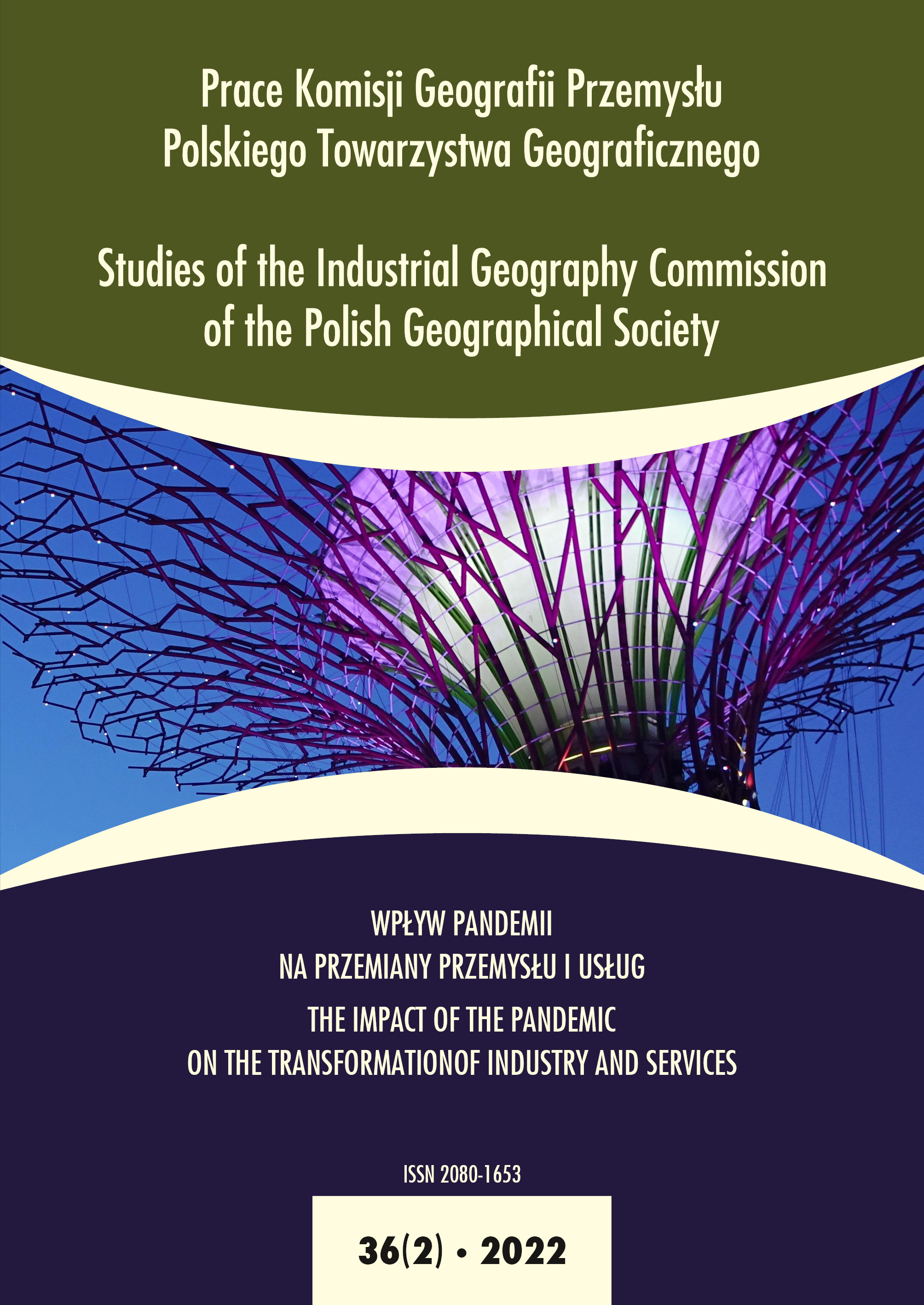Externalities of knowledge diffusion in cities and the COVID-19 pandemic
DOI:
https://doi.org/10.24917/20801653.362.15Keywords:
knowledge diffusion, knowledge spill overs, externalities, COVID-19 pandemic, business process outsourcingAbstract
The research aims at reviewing concepts and debates on knowledge flow and mutual learning as externalities in cities, and to investigate the extent of change in the organization of work in enterprises as a result of the pandemic. The following research hypotheses were adopted: a) in the business service sector the change of the work model from stationary to remote or hybrid (combining stationary and remote mode) is a permanent effect of the COVID-19 pandemic, b) said change has a negative impact on the informal flow of knowledge. The study used a qualitative descriptive method referring to a critical review of the literature on the subject and surveys.
Downloads
Metrics
References
ABSL. (2021), Sektor nowoczesnych usług biznesowych w Polsce. Pozystkano z: https://absl.pl/pl (dostęp: 15 grudnia 2021).
Amin, A., Cohendet, P. (2004). Architectures of Knowledge: Firms, Capabilities, and Communities. Oxford: Oxford University Press.
Augustyn, K. (2017). Koncepcja oceny efektu spillover indywidualnej kreatywności pracowników przedsiębiorstw o zróżnicowanym stopniu know‑how. Nierówności Społeczne a Wzrost Gospodarczy, 52, 362–371.
Florida, R., Rodríguez‑Pose, A.; Storper, M. (2021). Cities in a post‑COVID world. Urban Studies, 1–23. doi: https://doi.org/10.1177/00420980211018072
Harasimowicz, A. (2015). Efekty aglomeracji – czynnik czy bariera rozwoju miast? Analiza wybranych aspektów w świetle literatury przedmiotu. Studia Miejskie, 20, 23–34.
Huderek‑Glapska, S. (2014). Efekty zewnętrzne transportu. Aspekty teoretyczne. Zeszyty Naukowe Uniwersytetu Szczecińskiego. Problemy transportu i logistyki, 813, 83–97.
Jewtuchowicz, A. (1987). Rozwój miast, uprzemysłowienie i efekty zewnętrzne. Acta Universitatis Lodziensis. Folia Oeconomica, 69, 7–19.
Marshall, A. (1920). Principles of Economics. Eight Edition. London: Palgrave Macmillan.
Marszał, T. (2011). Miasto innowacyjne – koncepcja i uwarunkowania rozwoju. W: S. Makieła, A. Szromnik (red.), Miasto innowacyjne – wiedza – przedsiębiorczość – marketing. Warszawa: Studia KPZK PAN.
Micek, G. (2017). Bliskość geograficzna przedsiębiorstw zaawansowanego przemysłu i usług a przepływy wiedzy. Kraków: Instytut Geografii i Gospodarki Przestrzennej Uniwersytet Jagielloński w Krakowie.
Piątkowski, M.J. (2020). Implementation of innovations in enterprises using the EU funds: A comparative analysis. Journal of International Studies, 13(2), 109–126. doi: https://doi.org/10.14254/2071- 8330.2020/13–2/8
Putman, R.D. (2000), Bowling Alone: The Collapse and Revival of American Community. New York: Simon&Schuster Paperbacks.
Sokołowicz, M., Zasina, J., (2016), Sektor kultury jako czynnik transformacji miasta przemysłowego w kierunku miasta kreatywnego i inteligentnego? Przykład Łodzi. Acta Universitatis Lodziensis Folia Economica, 324, 5–19. doi:https://doi.org/10.18778/0208–6018.324.01
Storper, M., Venables, A.J. (2004). Buzz: face‑to‑face contact and the urban economy. Journal of Economic Geography, 4, 4, 351–370. doi: https://doi.org/10.1093/jnlecg/lbh027
Urry, J. (2002). Mobility and Proximity. Sociology, 36(2), 255–274.
Downloads
Published
How to Cite
Issue
Section
License
Copyright (c) 2022 Studies of the Industrial Geography Commission of the Polish Geographical Society

This work is licensed under a Creative Commons Attribution-NoDerivatives 4.0 International License.
Articles are published under the terms of the Creative Commons License (CC BY-ND 4.0; Attribution– NoDerivs).

